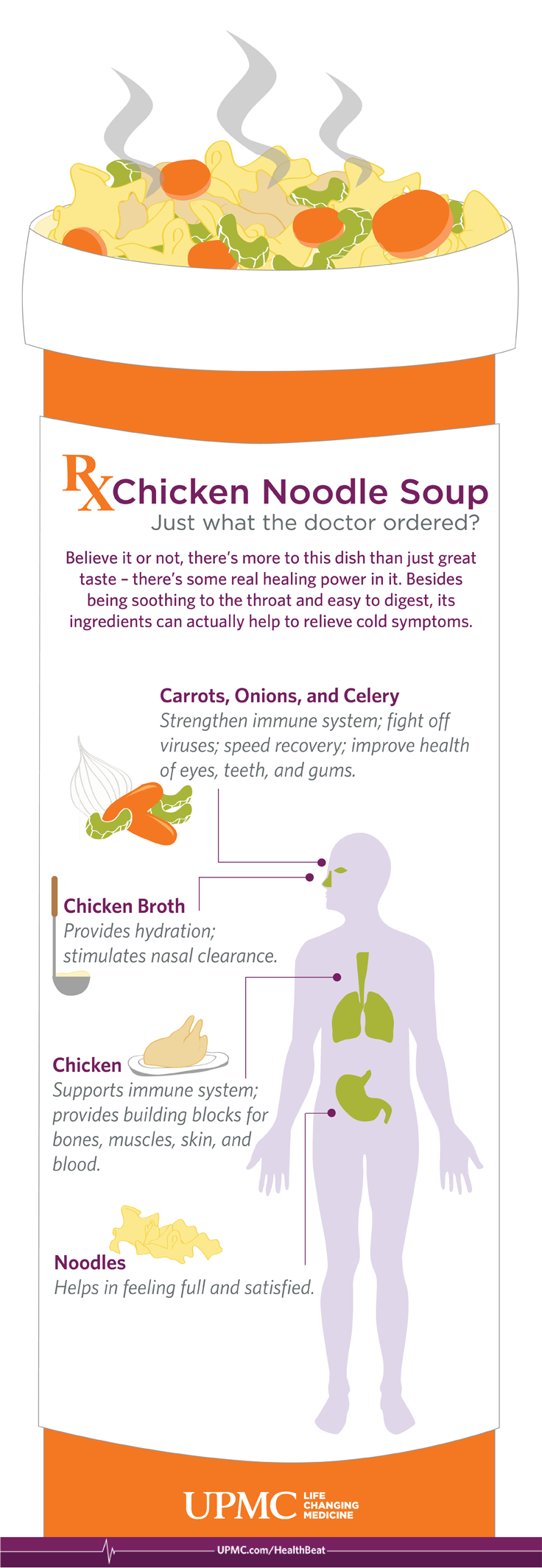Every childhood memory of being under the weather is likely to include a steaming-hot bowl of chicken noodle soup. But is it really the best remedy for a cold?
To understand the benefits of this nostalgic dish, let us first break down the various ingredients in chicken noodle soup.
Never Miss a Beat!
Subscribe to Our HealthBeat Newsletter!
Thank you for subscribing!
You can now select the specific newsletters you'd like to receive.
You are already subscribed.
Subscribe to more newsletters in our email preference center.
Sorry, an error occurred. Please try again later.
Get Healthy Tips Sent to Your Phone!
What’s in Chicken Noodle Soup?
There are many variations on this recipe, but you can easily make a delicious bowl of chicken noodle soup with these few ingredients:
- Chicken broth — Hearty broth contains vitamins, minerals, and some fat. The steamy liquid can help to improve upper respiratory symptoms by providing hydration and stimulating nasal clearance.
- Carrots, celery, onion — These vegetables contain vitamins A and C, and other antioxidants. These nutrients help build a strong immune system and fight off viruses. They may help the body recover faster from an illness.
- Chicken — The star of the dish provides protein, which also supports the immune system.
- Noodles — High in carbohydrates, they help you to feel full and satisfied.
- Herbs (optional) — Herbs like parsley, bay leaf, thyme, or dill can boost flavor and add more antioxidants to support your immune system.

What Are the Health Benefits of Chicken Noodle Soup?
A hot, steamy, soothing bowl of chicken noodle soup is just what the doctor ordered when you’re under the weather. Although the ingredients in chicken noodle soup are there for flavor, they also provide important health benefits.
The broth provides hydrating fluid and electrolytes like sodium, potassium, and magnesium. That’s especially helpful when you have a fever and run the risk of becoming dehydrated. The steam from hot broth also can open up nasal passages to help you breathe easier.
Chicken noodle soup is light and easy to digest, and quite nourishing. It provides just enough nutrients to keep up your energy when you don’t feel much like eating. A one-cup serving of homemade chicken soup has:
- About 150 calories.
- 13 grams of protein.
- 5 grams of fat.
- 12 grams of carbs.
Besides protein, it also provides zinc, vitamin A, vitamin C, antioxidants, and other nutrients to support your immune system. That wide range of nutrients is important because they all work together to help your body recover. If you want to get even more from your soup, feel free to add other healthy ingredients. Some good choices include:
- Ginger or cayenne pepper. The spiciness helps decrease congestion.
- Lemon juice. It adds more vitamin C.
- Garlic. It has antibacterial and antiviral properties.
- Leafy greens. They contribute more immune-boosting antioxidants.
The beauty of chicken noodle soup is that you can add as many (or as few) ingredients as you like. As you start to feel better, you can make your soup heartier by adding a can of beans or extra chicken. It’s an easy way to transition back to regular meals.
Why Is Chicken Noodle Soup Good for a Cold?
Studies show that a hearty bowl of chicken soup may help clear nasal congestion. It also has a mild anti-inflammatory effect that can help ease cold symptoms.
Chicken noodle soup makes a great fallback for cold winter days because of its wonderful nutrients. The ingredients are soothing to the throat, easy to digest, and taste great.
What Are the Best Foods to Eat When You Are Sick?
Besides soup, other good foods to eat (and drink) when you’re sick include:
- Yogurt. It’s full of protein and probiotics, which can support your immune system.
- Sugar-free cold cereal or oatmeal. They’re easy to digest and provide carbs for energy.
- Smoothies with frozen fruit and any kind of milk. They’re hydrating and can easily take the place of a meal.
- Fresh, frozen, or canned fruit (packed in 100% juice). Fruit provides antioxidants and vitamin C for your immune system and fiber to keep your digestive system moving.
- 100% fruit juice or tea. These are good choices for hydration.
Editor's Note: This article was originally published on , and was last reviewed on . Refreshed Feb. 23, 2022
About Digestive Disorders
UPMC Digestive Health Care cares for a wide range of gastrointestinal (GI) conditions and diseases, from diagnosis to treatment. Whether your digestive condition is common or complicated, our experts can help. Upon referral from your physician, we coordinate your testing and treatment. If you have a complicated condition, we can refer you to one of UPMC’s digestive health centers of excellence. Find a GI doctor near you.
